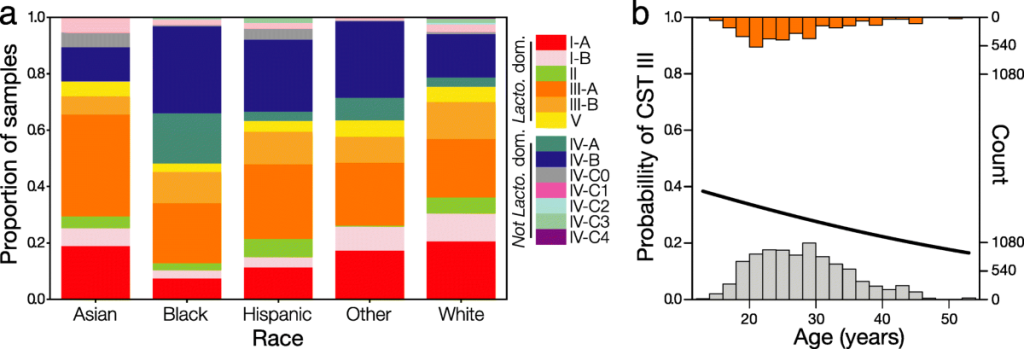Research
VIRGO
Several faculty members from CAMRI developed a comprehensive human vaginal non-redundant gene catalog called VIRGO. The researchers created the database by collecting and analyzing extensive genomic data from the vaginal microbiome. Their work involved sequencing and annotating genes to produce a catalog that accurately reflects the diversity of the vaginal microbiome.

VIRGO is a crucial resource for researchers studying the vaginal microbiome. The immense data set and detailed gene annotations within VRIGO allow researchers to compare and categorize complex vaginal microbe relationships, streamlining research and improving our understanding of vaginal health and diseases.
Metagenomic Community State Types

Johanna Holm, PhD, a faculty member at CAMRI, led her team in developing the novel metagenomic community state types (mgCSTs) to enhance the understanding of how the vaginal microbiome modulates protection against health issues. A Lactobacillus-dominated vaginal microbiome serves as the first line of defense against adverse genital tract health outcomes. Dr. Holm established these community state types using metagenomic sequences to characterize different vaginal microbiomes.
The creation of MgCSTs enables researchers to investigate multiple strains within the same species and explore the functional diversity of each species. This is the key for future research aimed at uncovering the pathways through which the vaginal microbiome protects health and combats disease. Ultimately, the MgCSTs will lead to the development of innovative therapeutic strategies to improve vaginal health.
Leveraging Data from NIH LSVF Data
Rebecca Brotman, PhD, a faculty member at CAMRI, has led her research group in publishing over a dozen groundbreaking studies on the vaginal microbiome leveraging the data from the NIH-funded Longitudinal Study of Vaginal Flora (LSVF). As Dr. Brotman explains, the research based on this pivotal study is “transforming our understanding of the vaginal microbiome and its essential role in women’s health.”

The research utilizing LSVF has explored a wide range of research questions, including evaluating the vaginal microbiota as a risk factor for sexually transmitted diseases (STIs), with a recent emphasis on Chlamydia trachomatis. Earlier studies examined the connection between bacterial vaginosis and STIs and the relationship between bacterial vaginosis and the development of pelvic inflammatory disease (PID). Further investigations have also considered the impact of nutrition, sexual networks, and feminine hygiene practices, broadening the contributions of LSVF in this area.
The Vaginal Microbiome Research Consortium
Since March 2018, the Gates Foundation has awarded multiple grants totaling over $7 million to Dr. Jacques Ravel, Director of the Center for Advanced Microbiome Research and Innovation (CAMRI). These grants are part of the Foundation’s initiative to establish the Vaginal Microbiome Research Consortium (VMRC), a collaborative network of scientists from Africa, South Asia, and the U.S. focused on developing clinical interventions to maintain or restore vaginal health.
The VMRC is conducting an FDA-sanctioned clinical trial in South Africa and the U.S. to test two novel live biotherapeutic products (LBP) developed in Dr. Ravel’s laboratory. These LBPs, composed of multiple strains of the beneficial bacterium Lactobacillus crispatus, are designed to prevent the recurrence of bacterial vaginosis (BV). BV is a significant risk factor for the acquisition and transmission of sexually transmitted infections, including HIV, as well as adverse pregnancy outcomes.
Additionally, these grants have supported the development of bioinformatics tools for analyzing vaginal microbiome data, including VIRGO 2.0, an enhanced, globally representative human vaginal microbial gene catalog. VIRGO is being leveraged to support VMRC research projects and clinical trials.






